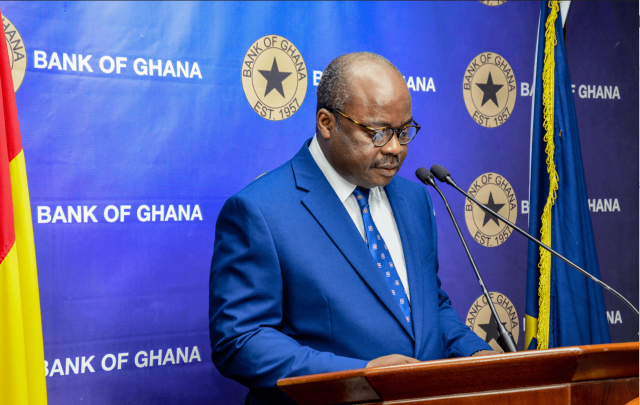Governor of the Bank of Ghana, Dr Ernest Addison, has expressed confidence that Ghana will get a second positive review of the deal with the International Monetary (IMF) which will result in the release of the third tranche.
He revealed that the team from the Fund will be arriving in Ghana in April for the second review of the $ 3 billion deal.
The country has already received two tranches, $600million each. The release of the third tranche will increase the total disbursements so far to US$1.56 billion.
Asked when Ghanaians should expect the third tranche while speaking at the 117th Monetary Policy Committee (IMF) press conference in Accra on Monday, March 25, Dr Addison said “On the third tranche of the IMF facility, we are expecting the Fund to come for a second review in April. I think they are going to be here for two weeks, during which they will broadly look at everything, fiscal performance, monetary policy performance, inflation, reserved accumulation as well as some of the structural benchmarks. This would be based on data at the end of December [Last year.]
“From our assessment, we are fairly confident of the performance at the end of December and are not expecting any surprises. If the review is successful, hopefully, the board of the IMF will meet by May or June and we should expect disbursements soon thereafter. This time we are not expecting $600 million, this time we $360 million.”
Regarding Ghana’s banking industry, Dr Ernest Addison noted that the sector is a profitable business in Ghana.
This explains the reasons why more investors want to move into the sector and inject their capital there, he said.
He revealed that no one has formally applied for the license yet.
“Banking is a profitable business in Ghana so I am not surprised that we still have investors that are looking at putting money into that sector.
“Hopefully, we might have somebody formally applying for a license before the end of the year but now we haven’t received any formal application,” Dr Addison said.
The MPC decided to maintain the policy rate at 29 %. Dr Addison stated although the inflation rate dropped marginally in February, there was a need to further monitor the trends hence the decision to keep at that rate.
Dr Ernest Addison further said that broadly, the banking sector remains stable, despite the elevated credit risks.
IMF board schedule to approve Ghana’s $600 million second tranche on Friday
Bank’s liquidity and profitability positions have continued to improve, he said.
Out of a total of 23 Banks, he stated, more than half are fully capitalised and have no need for recapitalisation.
Bank capitalization refers to the process of raising capital to strengthen a bank’s financial position. It involves increasing the bank’s capital accounts by issuing new shares, retaining earnings, or obtaining funds from external sources.
“Most of the outstanding banks have met more than two thirds of the required recapitalisation over a three-year period within one year as at the end of 2023,” he said.
“Revenue flows in the first two months of the year are lower vis-a-vis targets, and
expenditures have been fast-paced driven largely by clearance of arrears in the
energy sector.
“It is expected that revenue flows will pick up in March as the deadline
for filing tax returns in April approaches,” he further stated.
He further explained that in the domestic economy, the growth outturn for 2023 was stronger relative to target. The fourth quarter Gross Domestic Product (GDP) growth of 3.8 percent was driven by all three sectors.
The updated real Composite Index of Economic Activity (CIEA) recorded an annual growth of 3.5 percent in January 2024, compared to a contraction of 7.6 percent observed for the same period of 2023, affirming the rebound in economic activity.
The key growth drivers in the Index were port activity, imports, industrial consumption of electricity, domestic VAT, and tourist arrivals, he stated.
This was supported by broad improvements in sentiments, amid improvement in the PMI reflecting some uptick in business purchasing activity and new orders. Private sector credit, however, remained sluggish explained by the risk aversion of banks as asset quality weakened over the period.


















